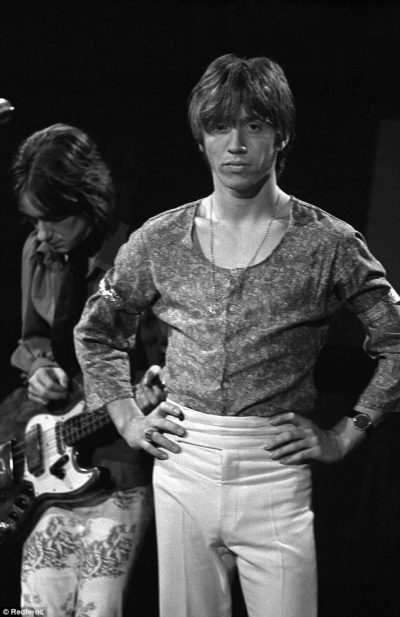Stevie Wright (Stephen Carlton Wright)

Stevie Wright was born in Leeds, England, in 1947 to George Wright and Dorothy Wright (née Longden); his family migrated to Melbourne, Australia, when he was nine. They moved to Sydney in 1960 and lived in Villawood near the Villawood Migrant Hostel. He was lead vocalist for local band, The Outlaws, and by 1964 had formed Chris Langdon & the Langdells, which initially played The Shadows-styled surf music but converted to beat music under the influence of The Beatles. After a Langdells performance, Wright met the Dutch-born Johannes Hendrikus Jacob van den Berg (later Harry Vanda), who was staying at Villawood Migrant Hostel, and his compatriot Dingeman van der Sluys (later Dick Diamonde). This introduction was arranged by their first manager a man named Alan Kissick. The pair convinced Wright to form a band with Vandenberg’s friend and fellow hostel resident Scottish-born George Young. Together with another Englishman, Gordon “Snowy” Fleet, they formed the Easybeats in mid-1964. The initial line-up of the Easybeats was Diamonde on bass guitar, Fleet on drums, Vanda on guitar, Wright on vocals and Young on guitar. During his time with the Easybeats, Stevie Wright was popularly and affectionately known as “Little Stevie”. Early hits for the Easybeats were co-written by Wright with bandmate Young, including, “She’s So Fine” (No. 3, 1965), “Wedding Ring” (No. 7, 1965), “Women (Make You Feel Alright)” (No. 4, 1966), “Come and See Her” (No. 3, 1966), “I’ll Make You Happy” (track on Easyfever EP, No. 1, 1966), and “Sorry” (No. 1, 1966). He was lead vocalist on their only international hit “Friday on My Mind”, which peaked at No. 1 in Australia in 1966. It made No. 6 in UK, Top 10 in Germany, the Netherlands, France and Italy and Top 20 in the US in 1967. In 2001, the song was voted the Best Australian Song of All Time by the Australasian Performing Rights Association, Wright was renowned for his energetic stage performance, which included acrobatic back-flips and mod dance moves. The Easybeats disbanded in UK in 1969 with Vanda & Young becoming freelance musicians, songwriters and producers. Aside from tracks for the Easybeats, Wright and George Young also wrote “Step Back” for Johnny Young (no relation) and his band Kompany, released in May 1966, which peaked at No. 1.
After the break-up of the Easybeats in 1969, Stevie Wright returned to Sydney from UK, and he formed a backing group, Rachette. He produced the debut single for local band Bootleg, “Whole World Should Slow Down”, in 1970. By late 1971, he was in Perth and joined Likefun with Ray Hoff on vocals (ex-Off Beats), Morri Pierson on vocals, Shirley Reid on vocals, John Tucak on bass guitar and Alan Wilks on organ. He soon returned to Sydney and from mid-1972 took the role of Simon Zealotes in the Australian stage production of Jesus Christ Superstar. Also in 1972, he joined Black Tank with Rory O’Donoghue on guitar and vocals (ex-The Pogs), Ken Firth on bass guitar (Tully) and Greg Henson on drums (Levi Smith Clefs). Stevie Wright signed with Albert Productions label in late 1973 which reunited him with former bandmates Vanda & Young who had returned from UK and were now staff producers and songwriters. Stevie Wright formed Stevie Wright & the Allstars for live performances, the line-up included, Johnny Dick on drums (ex-Billy Thorpe & the Aztecs), Tim Gaze on lead guitar (Tamam Shud, Kahvas Jute, Ariel), and Warren Morgan on piano (Chain, Billy Thorpe & the Aztecs). In April 1974 he released his debut solo LP, Hard Road, which featured the single “Evie (Parts 1, 2 & 3)” released in May. The song was written and produced by Vanda & Young, it became a hit—the only 11-minute song to chart at No. 1 anywhere in the world— and is now regarded as an Australian rock classic. Part 1 is subtitled, “Let Your Hair Hang Down”, and part 3 is “I’m Losing You”. Stevie Wright performed three concerts at the Sydney Opera House with backing by Vanda, Young and AC/DC’s Malcolm Young (George Young’s brother). Another Vanda & Young produced LP, Black-eyed Bruiser, followed in 1975, but it failed to chart in the Top 50. By mid-1975, the Allstars had transferred to John Paul Young (no relation) and Wright formed the Stevie Wright Band with Tony Bolton on drums (Aesop’s Fables, Country Radio), Larry Duryea on percussion (Tamam Shud), Russell Johnson on guitar (Mississippi, Country Radio), Billy Rylands on bass guitar (Lotus) and Peter White on keyboards. He died on 27 December 2015 at Moruya Hospital of pneumonia. Wright’s funeral was held at St Andrew’s Cathedral, in Sydney on 8 January 2016.
Born
- December, 20, 1947
- United Kingdom
- Leeds, England
Died
- December, 27, 2015
- Moruya, New South Wales, Australia
Cause of Death
- pneumonia

